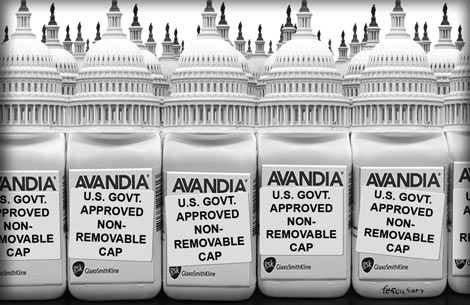
如果有一种畅销药,确有一定疗效,但会导致部分患者肝功能严重衰竭乃至死亡;还有一种药,会带来肠道出血和溃疡等危险的副作用,那该怎么办呢?
是应该让大型制药公司继续推销这些药,还是应该禁售它们呢?
这些药已存在100多年了:我们说的就是扑热息痛和阿司匹林。鉴于这两种药的毒性,搁到今天,它们或许根本通不过审批,可现在将它们撤出市场为时已晚;监管部门隔段时间就试图限制其使用,并禁止它们与其它药物同时服用。
问题在于,从止痛药到降胆固醇药,这些所谓的“白色药片”既能改善部分人的健康,但也能给其他人带来严重的副作用。必须将这些药的疗效和风险告诉每一位服用者。
但政客们并不善于权衡风险与回报,而更喜欢黑白分明的答案。这正是美国政客们一直揪住葛兰素史克(GlaxoSmithKline)的糖尿病药物文迪雅(Avandia)不放的原因所在——据称,该药与心脏病存在关联。与另一家饱受攻击的富时100成份股公司——英国石油(BP)一样,葛兰素史克也体会到了政治环境是如此的严酷和变幻莫测。
美国民主党众议员罗莎•德劳罗(Rosa DeLauro)上月在援引了两项研究后宣称:“文迪雅是危险药品,应撤出市场。”两党参议员均在对美国食品和药物管理局(FDA)的监管者施以高压。
这些干预措施是不明智的,原因有二。其一,政客们不具备判断药物是否应该撤出市场的专业知识。一些研究显示,文迪雅会增加患心脏病的风险;但还有一些研究证明,该药的危险程度并不比同类药品高。政客们根本不懂如何评审此类证据。
其二,也是更重要的一点,美国有现成的人选更有资格做出明智的判断——FDA的科学家。国会放着专业出身的监管人员不用,却选择了自己对着个别药物咆哮。
这是政治过分插足企业事务的模式的一部分。国会委员会从向企业传唤的成千上万份文件中,挑选出对自己有利的文件,声称自己掌握各行各业的专业知识,从石油钻探技术到衍生品。他们将自己标榜成真理追求者,通过公布摘录的细枝末节,让企业高管们难堪。
除了明显的伪善外——他们实际上是在追逐战利品,以便在选民面前炫耀——这根本不是他们的职责。他们的职责是确保监管部门有资金来源,且结构合理,然后将处方药安全等复杂事务交给相关官员来决定。
相反,在媒体的支持下,这些委员会急于做出判断。FDA顾问团上周召开会议,决定是否应该将文迪雅撤市或限制其使用(已于14日下午做出裁决)。国会在会前就已拿定了主意。
没有什么迹象显示,FDA在文迪雅问题上工作懈怠。实际上,自2007年以来,FDA的科学家就一直进行着激烈的内部辩论——2007年,一个顾问小组以22人赞成、1人反对的投票结果,准许文迪雅继续销售,但必须附有警告。
自那时起,FDA内部主管新药在美销售审批的新药审评办公室(Office of New Drugs),与监测在售药品的药品监测和流行病学办公室(Office of Surveillance and Epidemiology,简称:OSE),就一直为文迪雅的疗效和风险争论不休。
这没有任何不妥之处。尽管政客们总是找茬指责文迪雅——OSE的官员们认为,服用该药的糖尿病患者患心脏病的可能性要高出40%——但这并非一个确凿的结论。文迪雅已接受了反复试验,但由于参数不同,结果各有不同。
在药物投放市场后进行研究,比临床试验第三阶段——制药企业寻求监管部门批准的最后阶段——更有可能发现问题。不仅有更多的人服药,还常常有老年患者一把一把吞食治疗各种慢性病的药。
咨询公司贝恩(Bain & Co)估计,FDA及其它监管机构在药品投放市场后进行的研究,在70%至80%的情况下会降低药物对企业的价值。在默克(Merck) 2004年停止销售止痛药万络(Vioxx)后,对于如此严格审查之下的药,医生们在处方时都慎之又慎。
至于文迪雅,自2007年有研究证明,该药会增加患心脏病风险后,其销售额已经下降。医生们纷纷转开日本武田制药(Takeda)生产的同类药吡格列酮(Actos)。葛兰素史克目前最大的烦恼是,要向以所谓的副作用为由提起诉讼的患者赔偿多少——估计在10亿至50亿美元之间。
我们不应过于同情葛兰素史克——文迪雅事件带给它的损失,要远远小于墨西哥湾漏油事件带给BP的损失,且该公司的营运利润率仍保持在30%左右。美国曾经是无可匹敌的最有吸引力的畅销药市场;如果美国的监管变得严厉一些,也不见得是件坏事。
但是,之所以需要FDA和目前正在审查文迪雅的欧洲药品管理局(European Medicines Agency)等监管部门存在,就是因为有关药物风险和疗效的决定很难做出,需要审慎的权衡,尤其如果相关药物正在现实世界得到医生的处方和病人的服用。对于某些患者能够延长生命的药,对其他人可能是毒药。
政客们有其擅长的本事,但不应继续冒充医生和科学家了。
译者/陈云飞
http://www.ftchinese.com/story/001033665

What if there were a popular drug that had moderate benefits but was known to cause acute liver failure and death in some patients? Or another drug that had dangerous side effects including intestinal bleeding and ulcers?
Would it be right to let big pharmaceutical companies carry on marketing and selling them or ought they to be banned?
These drugs have existed for more than a century: they are paracetamol and aspirin. Perhaps they would not even be approved now for fear of toxicity but it is too late to withdraw them; instead, regulators periodically try to limit their use and to stop them being taken in combination with other medicines.
The point is that so-called “white pill” medicines, from painkillers to anti-cholesterol drugs, are chemicals that improve the health of some humans but can cause serious side-effects in others. Anyone who takes them needs to be informed about the benefits and risks.
But politicians are not good with balances of risk and reward, preferring black-and-white answers. This is why US politicians have been fiercely on the trail of Avandia, the anti-diabetes drug made by GlaxoSmithKline that has been linked with heart attacks. Like BP, another FTSE 100 company under attack, GSK is finding the political climate hard and capricious.
“Avandia is dangerous and should be pulled from the market,” declared Rosa DeLauro, a Democratic member of the House of Representatives last month, citing two studies. Senators from both parties have been putting heavy pressure on regulators at the Food and Drug Administration.
Such interventions are unwise for two reasons. First, politicians lack the expertise to judge whether drugs should be withdrawn. Some studies suggest Avandia heightens the risk of heart attacks; others that it is no more dangerous than a comparable drug. Politicians are not trained in how to sift such evidence.
Second, and more importantly, there are people nearby who are far better qualified to make a sound decision – the FDA's scientists. Congress has a pedigree watchdog to hand but has instead chosen to bark about particular drugs itself.
This is part of a pattern of political over-reach in business affairs, with Congressional committees cherry-picking thousands of documents they subpoena from companies to claim expertise on everything from oil-drilling techniques to derivatives. Presenting themselves as seekers after truth, they publish tiny extracts to embarrass executives.
Apart from the patent hypocrisy – they are really after scalps they can parade in front of voters – this is not their job. Their role is to make sure regulators are funded and correctly structured to let officials decide on complex matters such as prescription drug safety.
Instead, they rush to judgment, with the support of the media. By the time an FDA advisory panel met this week to thrash out whether Avandia should be withdrawn or its use limited (it was due to vote yesterday afternoon), Congress had made up its own mind.
There is little sign that the FDA has been slacking on the issue of Avandia. In fact, its scientists have been engaged in a robust, not to say ferocious, internal debate since 2007, when an advisory panel voted by 22 to one to keep Avandia on the market with added warnings.
Within the FDA, the Office of New Drugs, the body that decides whether to let new medicines be sold in the US, and the Office of Surveillance and Epidemiology, which monitors drugs after they are on sale, have been arguing ever since about its benefits and risks.
There is nothing wrong with this. Although politicians have picked on the evidence against Avandia – OSE officials believe diabetes patients who take it are 40 per cent more likely to suffer heart attacks – it is not a clear-cut decision. Avandia has been subjected to repeated trials with different parameters that have had varying outcomes.
Studies after drugs have come to market are more likely to discover problems than Phase III trials, the final step before drugs companies seek approval from regulators. Not only are far more people taking each pill but older patients are often taking batches of pills for various chronic conditions.
Bain & Co, the consultancy, estimates that post-launch studies by the FDA and other regulators reduce the value of drugs to companies in 70 to 80 per cent of cases. After the experience of Vioxx, the painkiller that Merck withdrew from sale in 2004, doctors are wary of prescribing drugs under such scrutiny.
In Avandia's case, its sales have fallen since a 2007 study that found a heightened risk of heart attack, with doctors switching to Actos, a rival drug made by Takeda. GSK's biggest worry now is how much it will have to pay people who sue over its alleged side-effects – estimates range from $1bn to $5bn.
We should not feel too sorry for GSK – the Avandia affair is far less costly to it than the Gulf of Mexico spill to BP, and its operating margin remains at about 30 per cent. It is not a bad thing if the US, which used to be incomparably the most attractive market for blockbuster drugs, is getting a bit tougher.
But regulators such as the FDA and the European Medicines Agency, which is now reviewing Avandia, are there because decisions over the risks and benefits of drugs – particularly as they are prescribed and taken in the real world – are difficult and finely balanced. A life-prolonging pill for one group of patients is poison for others.
Politicians have their own skills, but they should stop masquerading as doctors and scientists.
没有评论:
发表评论